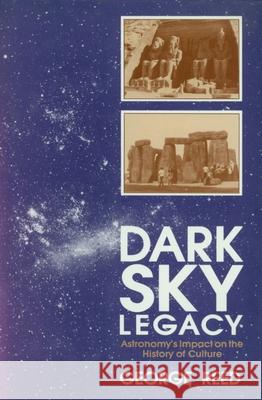Dark Sky Legacy » książka
Dark Sky Legacy
ISBN-13: 9780879755416 / Angielski / Twarda / 1989 / 208 str.
The way mankind has responded to the dark sky throughout history has determined humanity's scientific - and cultural - progress. In this way, astronomy is in some way connected to everything. This fascinating theme is explored in Dark Sky Legacy.
George Reed examines the powerful influence of the cosmos on cultural and societal development, reviewing mankind's historical propensity for projecting human experience into a cosmic framework and the centuries-old relationship between astronomy and astrology, the result of which is the emergence of the age of science. Since then, he writes, the purpose of astronomy has been to observe celestial objects for the advancement of scientific knowledge, while astrology deals only in the possibility that celestial bodies influence events on Earth.
Reed asserts that the movement away from an inward-looking, "meaningful" cosmos toward an outward-gazing, impersonal one is a shift that has had enormous repercussions in every aspect of human life. He points out that astrology provides a scheme in which the believer is an integral component of an animistic, cyclical universe. Conversely, the pursuit of science and astronomy is a mechanistic, linear activity, which seeks extrinsic answers in terms of precise relationships between sense perceptions.
Dark Sky Legacy probes the divergent approaches to the universe that compel individuals and cultures to pursue astrology or astronomy, the intuitive or the analytical. Blending modern science, ancient science, mythology, history, literature, and naked-eye astronomy, and spiced with fascinating detail about astronomy, astrology, celestial mythology, and calendar development, the book is an engrossing study of the profound impact of mankind's relationship with the universe.











